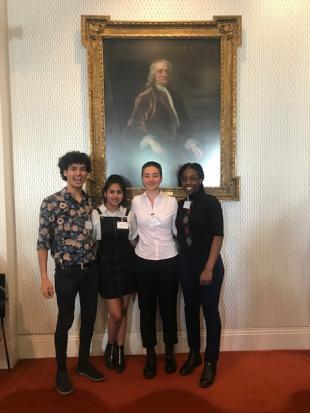Post date:
The GGCS Competition invites students from across the globe to come up with innovative engineering solutions to society’s grand challenges, ranging from world hunger and water shortages to equal access to technology.
Katherine and Whitney, alongside team mates Taha Gomma and Nikhitha Anto, were shortlisted for their proposal to develop an artificial intelligence (AI) device that could pre-emptively diagnose, predict and prevent life-threatening health conditions such as cardiovascular disease. They are one of only 20 student teams across the UK to reach the shortlist stage.
Whitney and Katherine took part in the following interview to mark International Women in Engineering Day on 23 June 2019.
Why did you choose to study engineering? Is there anything in particular that first sparked your interest?
Whitney: I chose to study engineering because I find it fascinating how engineers use their skills to change the world by inventing and creating new stuff.
I have always had a particularly strong liking for chemical engineering because of how you use and apply knowledge from different fields, not just chemistry and mathematics. Not to mention the numerous challenges you encounter during your studies and career. I also preferred this field of engineering as you have a large number of sectors in which you could use your skills to transform the world and make it a better place to live.
Katherine: Ever since I was a child I have enjoyed finding solutions to problems, whether it was simple everyday problems or broader ones. I even used to have a diary with a record of all my projects and their designs, for example a small polystyrene solar-powered boat that would navigate on the river next to where I lived as a child.
What have been the highlights and challenges of studying engineering at University so far?
Whitney: It has been very exciting to study chemical engineering as I have come to truly understand the meaning of team work. It amazes me how people have different ways of analysing problems and moving ahead.
The only difficulty I have encountered is the novelty of some aspects of the course. However I think difficulty pushes you to work harder in order to gain a better grasp of the subject. Once figured out, the solutions to these challenges become interesting and exciting to know.
Katherine: I‘ve enjoyed having more time for myself this year, compared to my last year in French high school! I have been able to learn violin, start karate, go to the gym, act in two theatre plays and work as a piano teacher throughout the year.
On the other hand, as a very active person, it can be challenging to maintain focus in lectures, which means I need to spend more time studying on my own, especially during exam revision.
Do you have particular career aspirations at the moment?
Katherine: I would like to start my own company as soon as I am ready. I already have some ideas of projects I could develop, including the Optical Heart Monitor which I have been working on with my team for the Royal Academy of Engineering student competition of the Global Grand Challenges Summit 2019. I have more ideas including providing energy to communities in danger following earthquakes.
Whitney: I am in my first year and I’m not yet sure which career path I would like to pursue. I am interested in many sectors including energy, pharmaceutical, and consulting.
What advice would you offer to other young women thinking of studying engineering at University?
Whitney: Follow your dream and never give up your goal until you have achieved it. By doing this, you are doing what it takes to be the best you can become. So go ahead and create your own formula for success and satisfaction.
Katherine: This may sound obvious but many people have ignored this before coming here: make sure you like maths because it is a significant part of all engineering programmes!
Another piece of advice would be to make friends and have fun: I don't think I've enjoyed life more than when I’ve been hiking around Edinburgh, with friends, family or by myself.



